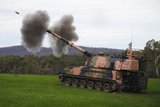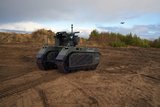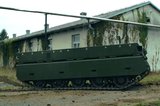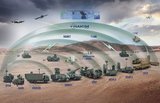Swedish FMV receives first batch of Patria AMVs
Patria has delivered the first batch of AMV armoured wheeled vehicles to the Swedish Defence Materiel Administration (FMV). Sweden ordered 113 of the vehicles under an contract signed in 2010 worth approximately €250 million.
Upon delivering the vehicles, Seppo Seppälä, president of Patria Land Systems and Patria Land Services, said: ‘The production of Patria AMVs has proceeded according to plans, and now the first vehicles are ready for delivery. Patria AMV represents state-of-the-art technology and it combines our extensive experience and know-how, which are highly appreciated by the users of the vehicles.
‘The Swedish troops will receive a modern vehicle which offers excellent mobility and a high level of protection. These new armoured wheeled vehicles represent a continuation for the Patria AMV product family, which has received excellent feedback for its performance in international operations.’
Patria signed a contract with the FMV in 2011 covering the technical maintenance and upgrading of approximately 200 XA-vehicles; the agreement is being updated annually and will also include the life-cycle support of the next generation Patria AMV armoured wheeled vehicles.
More from Land Warfare
-
![World Defense Show 2026: DOK-ING working on MV-8 variants and reveals specs ahead of Eurosatory]()
World Defense Show 2026: DOK-ING working on MV-8 variants and reveals specs ahead of Eurosatory
The Croatian company began the development of the MV-8 modular uncrewed platform in the early 2020s. Specifications for the vehicle were revealed to Shephard at World Defense Show 2026.
-
![World Defense Show 2026: Turkish and European industries will cooperate, says Aselsan boss]()
World Defense Show 2026: Turkish and European industries will cooperate, says Aselsan boss
Aselsan was formed 50 years ago in response to difficulties Turkey was facing in sourcing major systems internationally. While some challenges still remain, company president Ahmet Akyol believes a rapprochement is possible.
-
![World Defense Show 2026: Russia reveals details of new loitering munition]()
World Defense Show 2026: Russia reveals details of new loitering munition
The Kalashnikov RUS-PE cannister-launched man-portable loitering munition was displayed as a model at World Defense Show 2026 with a company official telling Shephard it was “in service and in low-rate initial production”.
-
![World Defense Show 2026: MARSS displays new Nation Shield air defence C2 system]()
World Defense Show 2026: MARSS displays new Nation Shield air defence C2 system
Nation Shield is the latest iteration of the MARSS C2 system and is designed to provide C2 further forward along with more capable air defence.






















